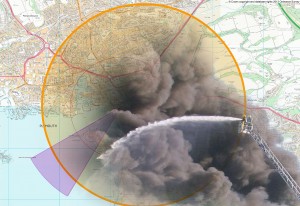Croydon, 26 November 2014 – Plymouth is using the latest mapping technology to prepare the city for major emergencies. Plymouth City Council is using a Geographic Information System (GIS) from GGP Systems to help produce emergency planning maps. The Council’s Civil Protection Unit has created the mapping for a range of exercises relating to a major incident in the city such as flooding, terrorist attacks or even a nuclear accident. Prepared for use in the event of a real life scenario, the maps are however vital for staff training, inter-agency coordination and have supported the launch of a new warn and inform service for residents and businesses close to locations identified as possible high risk sites.
“Although uncommon, major emergencies are inevitable fact of life. They can manifest themselves in many forms ranging from natural disasters, such as severe weather or flooding, to man-made incidents associated with commercial or industrial activity and even acts of terrorism and war. As a Unitary Authority, with statutory emergency planning and community resilience responsibilities, we must respond in a rapid, effective, efficient and co-ordinated manner whatever the emergency may be.”
“To achieve this it is essential that we not only plan for all eventualities but undertake staff training and devise and run exercises designed to both reinforce this training and validate agreed procedures,” commented Scott Senior, Civil Protection Manager within the Civil Protection Unit of Plymouth City Council. “The maps produced in GGP GIS are critical not only in the planning of emergency responses but in the training of staff and the co-ordination of agencies in both desktop and live exercises, as well as actually in an emergency, as defined in the Civil Contingencies Act 2004.”
The primary function of GGP GIS within the Civil Protection Unit is to map public information zones around sites where a major incident could occur. These sites currently include oil terminals, fuel distribution centres, munitions stores as well as the Devonport Dockyard which berths and refuels nuclear powered submarines. The sites are analysed in GGP GIS and, using the Council’s centralised address database (Local Land and Property Gazetteer) individual properties that may be affected are identified. In the case of an incident these addresses will be issued with relevant information and will be the addresses the Council evacuates should the need occur.
GGP GIS is also used in live exercises, such as the multi-agency scenario of a radioactive leak from the city’s Devonport Dockyard codenamed Short Sermon. “By mapping the exact area of impact of such an incident we can quickly identify affected properties and export this information to share with other authorities or agencies that would be involved in the emergency response to a major incident in Plymouth,” concluded Scott Senior. “In a real life scenario this information would be essential in managing the distribution of potassium iodide (a salt of stable iodine that can help block radioactive iodine from being absorbed by the thyroid gland) to affected properties.”
Contacts:
Reader enquiries to GGP Systems on tel +044 (0)20 8686 9887
Editorial enquiries, contact Robert Peel on tel +44 (0)1666 823306
Colour separation requests to robert@market-it.co.uk
www.ggpsystems.co.uk
Notes to Editors:
GGP Systems specialise in GIS and Gazetteer Management solutions specifically designed for the UK public sector. The South London based company provides easy to use software for the creation and management of corporate property databases, the ability to add and use a spatial element to all location based information and a range of solutions to meet both national and international Government directives.
www.ggpsystems.co.uk.co.uk.
NOTE:
GGP Systems has moved office and the new address is: Amp House, Dingwall Road, Croydon, CR0 2LX.
Contact telephone numbers remain the same; telephone 020 8686 9887 and fax 020 8686 9887, as does email sales@ggpsystems.co.uk and web address www.ggpsystems.co.uk.







